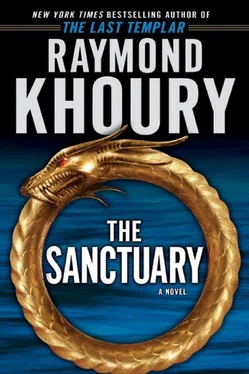Mia hadn’t had much trouble sneaking out of the hotel unnoticed. Kirkwood’s car was parked around the corner. At the airport, there were no formalities to go through; she and Kirkwood were driven straight to the small plane that was waiting for them, its props spinning. Its wheels lifted off virtually as soon as they reached it. Clearly, the UN held sway in Beirut, even more so since several thousand of its troops were currently keeping the peace in the south of the country.
Diyarbakir was northeast of Beirut, and the direct flight path would have cut across Syria diagonally, but Syrian airspace was tightly controlled. Kirkwood had decided on a more discreet, if slightly longer, course. They would fly north, keeping well out of Syrian airspace, until they reached the Turkish coast. There, they’d bank right and head east, inland, to Diyarbakir.
She turned away from the distant coast shimmering along the horizon as Kirkwood came back from conferring with the pilots. He sat down opposite her and opened up the map in his hand.
“Farouk’s friend is called Abu Barzan,” he informed her. “He crossed the border point here, at Zakho, and drove into Turkey yesterday.” Kirkwood pointed at the map, showing her the border crossing that was close to the tip where Turkey, Syria, and Iraq met. “He’s in Diyarbakir.” He indicated a town that was around fifty miles north of the Syrian border.
“Is that where he’s meeting his buyer?” she asked.
Kirkwood nodded. “We’ve got a couple of private contractors meeting us there. They’ll take us to him.”
It was happening too fast. She wasn’t sure what to make of the sudden development. “How did you manage to track him down?”
Kirkwood hesitated. “He wasn’t too hard to trace,” he offered as he folded up the map. “Mosul’s much smaller than Baghdad, and he’d boasted about making a big score.”
“How are you going to get the book from him?”
Kirkwood seemed uncomfortable with her questions. “He’ll hand over the book and the rest of the pieces, in exchange for us not shipping him back to Iraq for prosecution.”
“What about his buyer?” Mia asked. “He could be part of this, couldn’t he?”
Kirkwood shook his head. “He’s probably just some antiquities dealer from London or Frankfurt,” he speculated dismissively. “Hardly our concern. We just need to get the book to trade for Evelyn.”
Mia frowned. She hadn’t heard anything on that front since making her televised plea, and she wasn’t hugely comfortable with being out of touch with the embassy — or even with Corben. “We don’t know if the kidnappers have made contact yet,” she noted.
“They will. We can set up another press conference, say we caught some smugglers, make sure the book’s front and center.” Kirkwood looked at her with fierce determination. “Don’t worry. They’ll call. I’ll make sure of it.”
Mia nodded and looked out the window, lost in her thoughts.
After a moment, Kirkwood’s voice brought her out of her daze. “What is it?”
Weariness lined her face. “It’s hard to imagine. That we’re doing this. That something like this could actually exist.” She shook her head and scoffed, but it was more out of tiredness than anything else. “It’s like Frodo’s ring. Tempting man with its power over nature, with its promise of long life. Toying with our easily corrupted hearts.”
Kirkwood pursed his lips doubtfully. “I wouldn’t call it a corruption at all. Dying is such a huge waste of talent. And wisdom.”
As the King Air skimmed the thin wisps of cloud, they discussed the profound changes a potential “magic bullet” of longevity would trigger, the seismic shifts in the way we live. Overpopulation was the obvious problem. From the hominids’ first appearance on the planet, it had taken us 80 million years to hit the billion mark in the early 1800s. It took well over a hundred years to hit the second billion in 1930, but ever since, we’ve been addding a billion more every fifteen years or so. This increase comes almost entirely from less developed countries; the more developed countries, in fact, are barely producing enough babies to maintain their current population levels. Still, having five or ten generations of the same family surviving concurrently would cause all kinds of upheavals. More natural resources, food, and housing would be needed. The welfare and pension systems, among others, would require even more of an overhaul than the one they already need. And human relations would be drastically, dramatically different.
Marriage — would the institution still mean anything when no one would really expect to stay with one other person for a couple of hundred years? Children — how would they age and behave relative to their parents? The changes would also extend to work. Careers. Retirement. Would people have to work throughout their longer lives? Probably. Could they cope with that, mentally? What happened to the notion of the old moving on so the young could find their place in life? Would there be room for anyone to ever get promoted? And what about less obvious implications, such as on prison sentences, for instance? Was the threat of a thirty-year sentence as much of a deterrent to someone who expected to live a couple of hundred years?
The more they talked it through, the more Mia realized that if this was real, every aspect of life as we knew it would need to be radically redefined. She’d never really explored its ramifications beyond scientific conjecture and idealized what-ifs, but thinking about it as potentially real, it was as daunting, even frightening, a prospect as she could imagine.
“We’d be living in a ‘posthuman’ age,” Kirkwood said. “And that terrifies the conservative and the religious establishment. But then, that fear is irrational. It wouldn’t happen overnight. It would be a gradual change. The ‘fix,’ if it were ever discovered, would be announced and people would just, well, not age. Or they would age very, very slowly. And the world would adapt. We were already hugely different from those who lived a hundred years before us. To them, we’re already ‘posthuman.’ And we seem to be handling the improved longevity, the medical advances and the technological innovations pretty well.”
But then, Mia knew, common sense and the greater good didn’t necessarily always prevail. Fear of change, combined with a patronizing, arrogant, and pontifical worldview, was already aligned to block such a discovery. Beyond its dogmatic, conservative mind-set, the government was daunted by the potential costs — never mind the huge potential savings in health-care costs due to chronic age-related diseases — and organizational changes that significantly longer life spans would incur. Big pharmaceuticals were happy to watch our bodies fall apart and sell us disease-management drugs. The antiaging creams, supplements, and hormones that didn’t really work were also highly lucrative—$6 billion a year’s worth, in fact.
“The people against it,” Kirkwood concluded, “they’re usually either deeply religious, or they’re philosophers who don’t live in the real world anyway. They compare us to blooming flowers or use some other inane analogy to celebrate the importance of death, they quote Greek and Roman thinkers or, inevitably, scripture. For them, life is defined by death. I’d say it’s the exact opposite: Life is defined by the ambition, the need, the urge, to avoid death. That’s what makes us human. It’s why we have doctors and hospitals. We’re the only species that’s aware of our own mortality, we’re the only species that actually has the capability, the intellect, the awareness, to aspire to defeat it. It’s been an ambition of man ever since we’ve walked on the planet. It’s part of our evolutionary process.”
Читать дальше












